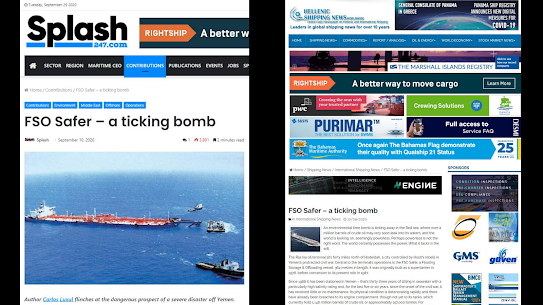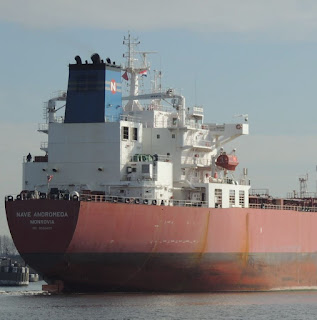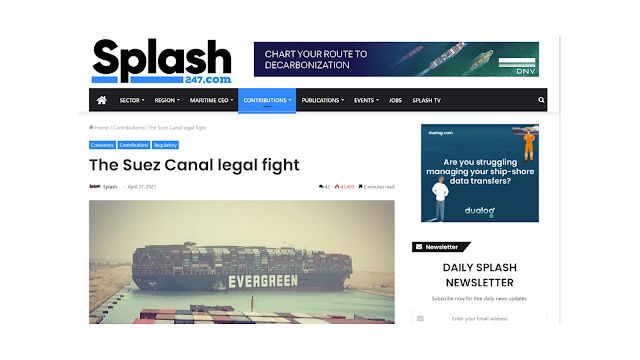FSO Safer - A Ticking Time Bomb
Two major shipping publications recently published an article I wrote about the factors surrounding a impending maritime disaster. As an author of a plausible oceanic catastrophe, The Ocean Dove, I am fascinated by political agendas that act against humankind.
Read it in full below or click on the links...
- SPLASH : FSO Safer - a ticking time bomb
- HELLENIC SHIPPING NEWS : FSO Safer - a ticking time bomb
A ticking bomb
Carlos Luxul, author of The Ocean Dove
TheOcean Dove focuses on a new kind of danger arising from abuses of shipping’s loose regulatory framework. Thankfully it’s a novel, and while the disaster scenario in its climax is rooted in plausibility and could so easily happen, I sincerely hope it doesn’t.
Meanwhile, back in real life, a disaster is just waiting to happen and the world seems powerless to stop it. Perhaps powerless is not the right word. The world certainly possesses the power. What it lacks is the will.
The Ras Isa oil terminal sits at the foot of the Red sea about forty miles north of Hodeidah, a port city controlled by Houthi rebels in Yemen’s protracted civil war. Central to the operations of the Ras Isa terminal is the FSO Safer - a Floating Storage & Offloading vessel. The Safer was built in Japan in 1976 as a super tanker and traded globally until old age saw it converted and pensioned off to a more sedentary role as a floating storage plant. In line with the practices of that period, it was constructed as a single-skin vessel, without the added security of modern double-hull designs. It is 362 metres long and its nominal deadweight is 406,000 tonnes - and those who recognise black humour will not be shocked by the irony in its name.
Conversion to its new role took place in 1987 and by 1988 it was stationed at Ras Isa. That’s thirty three years of sitting in seawater in a location with a particularly high salinity rating and, for the last five or six years since the onset of the civil war, it has received little or no maintenance. Its physical state is deteriorating rapidly and there have already been breaches to its engine compartment, though thankfully not yet to its tanks, which currently hold 1.148 million barrels of crude oil, or approximately 157,000 tonnes. For comparison, the Exxon Valdez was merely carrying around 35,000 tonnes when it met with disaster. Originally, the Safer was owned by the Yemeni government before it was seized by Houthi rebels in March 2015.
The Safer is a ticking bomb, ready to go off at any time. Years of inactivity and a lack of maintenance have taken their toll, and while Japanese steel is recognised for its quality, there’s a limit to its endurance. Rust is a voracious eater. Its unrelenting appetite will not be satisfied until it has devoured the ship’s hull, and while there are no reliable estimates of the present thickness of the hull’s plating, it is reasonable to assume that it is down to its last few millimetres. It is also reasonable to expect that in certain places the fragile hull is being kept more or less intact by a generous coating of marine encrustations.
Though all sides recognise the imminent danger, central to the impasse as ever, is money. Those 1.148 million barrels of oil are worth just shy of USD fifty million at current market prices, and that’s a sizeable chunk of money that the Houthis are laying sole claim to. And while they are receiving no guarantees over money, they are not permitting access to the vessel. In addition, they are dropping very strong hints that they have mined the waters around it and rigged it internally with IEDs.
Needless to say, the Red sea is an ecological wonderland containing one of the world’s largest and most important coral reefs, along with a host of unique marine organisms. Currents and winds in the Red sea tend to switch around in summer and winter, alternating between northbound and southbound and vice versa. Depending on the season, an oil spill will either spread northwards along the shores of the Red sea’s littoral countries, or southwards to the coastlines of Djibouti and Somalia and out into the wider Indian ocean, where prevailing currents will sweep it down the coast of east Africa. Either scenario is equally unbearable.
All interested parties, including the Yemen’s warring factions and the proxy belligerents of Saudi Arabia and Iran, understand the imminent threat of a catastrophic oil spill, but years of UN dialogue and negotiation shows no sign of resolution. Iran, naturally, will not rein in its Houthi partners and the prospect of an oil spill along Saudi Arabia’s western shoreline no doubt fills it with glee. But Iran is nothing if not pragmatic, so a deal must be doable. The world’s interests in the Safer are being led by the UN, which needs to act now. It is also, finally, an opportunity for the UN to demonstrate that it has a purpose beyond being a mere talking-shop. As an institution, it has been in a state of permanent existential crisis since its inception, when in 1935 it failed its first serious test by washing its hands over Mussolini’s annexation of Ethiopia, and its track record since then has been consistently lamentable.
We must not entirely blame the UN though. Without the commitment of its member nations, whose political classes use it as a convenient scapegoat for their own inaction and chicanery, it will always be toothless. It does earn plaudits and success does come its way from time to time, particularly with humanitarian disaster relief, but these interventions are soft targets, vote winners for its ruling member states, and we need to recognised the UN for what it really is - a convenient buffer and a plausible excuse for politicians to hide behind. Now, surely, is the perfect opportunity for the UN to demonstrate its raison d’être and for the world’s political rulers to show their mettle. One without the other has been a dismal failure for nearly a century and time is running out – not just for the Safer.
The world possesses everything it needs to prevent the Safer from becoming an unmitigated disaster. It has the military power to secure the location and the technical expertise to secure the ship, its cargo, and the future of the Red sea’s environment. Our rulers face a stark choice. Either they choose to take action and firmly back the UN, or once again to look away and wring their hands before tapping out the usual platitudes on twitter.
Until next time...






Comments
Post a Comment